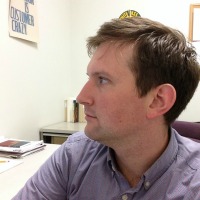
Fletcher Durant (@fletcherdurant) is the Preservation Librarian at University of Florida Smathers Libraries, and attended the 2017 DLF Forum as a Kress + DLF Fellow affiliated with DLF’s partner organization AIC.
After leaving the 2017 DLF Forum, I am still struck by the range of topics and approaches presented on the intersections of digital libraries, archives, and digital humanities. As a Kress+DLF GLAM Cross-Pollinator Fellow coming from a background as a library and archives conservator, the creative energy that is pouring into digital projects and collections is thrilling, but I am also struck by the parallels between emerging issues in preserving digital scholarship today and media art conservation over the past decade.
As digital libraries continue to mature, the needs of the field are reasonably shifting from content creation and interface development to producing digitally-based scholarship projects to utilize existing collections and data. But even as the creation of projects explode; network of scholarship develops beyond working with digital collections to begin citing existing digital scholarships; academic coursework focuses on teaching tools and theory; and academic review boards begin to assess digital output for promotion and tenure, earlier generations of digital projects are disappearing from view; the victim of obsolete formats, waning attention of creators, or the expiration of grant-funding. Creation is exciting; sustaining is not. The focus of my schedule at DLF was very much on creation and engagement in new and exciting ways, and it was a joy to revel in.
But…as a cross-pollinator if not truly an outsider, I am left to wonder where all these projects will be in 5 or 10 years. Some will be sustained and nurtured by creators. Others will limp along, residing on a server or cloud service, but with broken links and features that no longer function. But student work hosted on university servers long after graduation? Code in Amazon Cloud Services after subscriptions end? Hard drives in the back of closets (because mindful scholars will never store things in basements, attics, or garages)? Will there be tenure packets marred by digital “publications” that no committee can review or article citations with links that only lead to 404 pages?
The history of performance and media art is already filled with generations of works that reside only in the memories of attendees or a blurb in the Village Voice, secondary sources that are used to infer great meaning, but leaving questions of veracity and interpretation for future scholars to grapple with. One approach to “preserving” these types of ephemeral works is documentation based, with artist interviews serving as an understanding of what a work “is” and how it was intended to be consumed. For digital scholarship, this could mean a formal “About” page on every project that contains a detailed abstract, something static and easily crawled and captured by bots.
Another approach could be to require funded projects to produce a data management plan, as major scientific research funders demand. A DMP states how a creator intends to make their project accessible and for how long. These DMPs don’t ensure that projects succeed or survive, but they do force creators to confront some basic preservation issues during the planning stages, to make them face the potential mortality of their research.
Or perhaps we will resolve bit rot and storage costs to ensure that our projects exist and create universal emulation environments to ensure continued accessibility. DLF Forum is certainly a place for dreams to come true.
